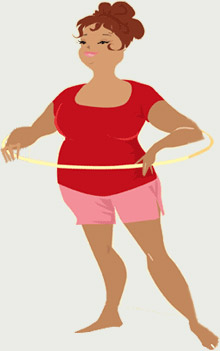Connection between obesity and heart disease
Posted in Weight Management on July 6, 2012. Last modified on October 18, 2019. Read disclaimer.
Did you know that as your body fat goes up, so does your risk for heart disease? That's especially troubling considering that 78 million Americans are considered obese.
+ Free Shipping & Returns on Eligible Items.
(*Amazon's Top 100 list updated hourly.)
2 Ways of measuring obesity
Overweight and obesity are determined quickly in two different ways:
- Body mass index (BMI) is a calculation involving your height and weight. BMI typically correlates with body fat, but because it doesn't actually measure body fat, it may not be accurate for everyone, especially those with a more muscular body type, such as athletes.
In adults, a BMI between 25 and 29.9 is considered overweight; a BMI of 30 or higher is considered obese. To learn your BMI visit the Adult BMI Calculator at the US Centers for Disease Control.
- Measuring your waist circumference is another helpful gauge. Standing relaxed, exhale and measure around your bare abdomen, just above the hip bone. The tape measure should be snug but not tight.
A person may be overweight if:
- Male waist circumference exceeds 40 inches
- Non-pregnant female waist circumference exceeds 35 inches
How obesity affects heart health
As your body mass index goes up, so does your risk for coronary heart disease (CHD) and heart attack. CHD occurs when a substance called plaque builds up inside the arteries. This can narrow or block the arteries and reduce the blood flow to the heart. This can lead to angina (chest pain or discomfort) or even a heart attack.
 Overweight and obesity can also result in high blood pressure. High blood pressure is twice as common in obese adults as in those at a healthy weight. Additionally, obesity is associated with elevated triglycerides and decreased HDL (good) cholesterol.
Overweight and obesity can also result in high blood pressure. High blood pressure is twice as common in obese adults as in those at a healthy weight. Additionally, obesity is associated with elevated triglycerides and decreased HDL (good) cholesterol.
Good news
The news isn't all bad: According to the United States Office of the Surgeon General, a weight loss of 5-15% of total body weight in an overweight or obese person reduces the risk factors for some diseases, particularly heart disease. Weight loss can also result in lower blood pressure, lower blood sugar and improved cholesterol levels.
In addition to maintaining a healthy weight, you can also help protect against heart disease by eating a healthy diet that includes plenty of fruits and vegetables, exercising at moderate intensity for 30 minutes most days of the week, not smoking and limiting the use of alcohol. Read tips for losing weight.

 Managing allergies and asthma
Managing allergies and asthma Mouse control and prevention tips
Mouse control and prevention tips How to prevent tooth erosion
How to prevent tooth erosion 20 Creative ways to stay cool this summer
20 Creative ways to stay cool this summer Outdoor summer safety tips for kids
Outdoor summer safety tips for kids Blood donation mini quiz
Blood donation mini quiz What's the connection between obesity and heart disease?
What's the connection between obesity and heart disease? The recipe for losing weight
The recipe for losing weight Why eating fish may help us live longer
Why eating fish may help us live longer Which fish are lowest in mercury?
Which fish are lowest in mercury? Our favorite fish taco recipe
Our favorite fish taco recipe Secrets for how to save money when shopping
Secrets for how to save money when shopping